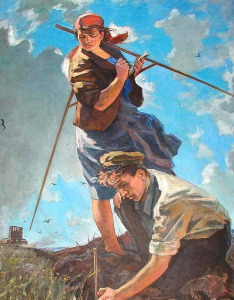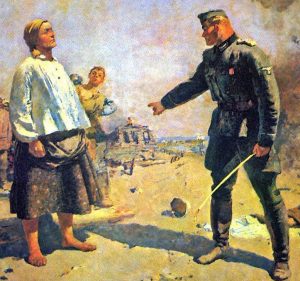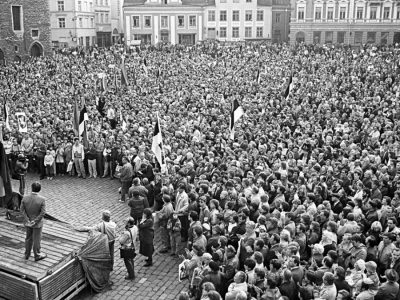Picture the scene. The year is 1957. The world is still recovering from the most brutal war in history. Millions of people were killed and the whole of Europe was decimated both economically and militarily. We, the US, are now the leading western power charged with cleaning up the whole mess. But the USSR, who was […]
Month: March 2017
8th Blog Post Guidelines
by •

Fedor Maliaev, “Virgin Lands” (1958)
“No Greater Love” – Soviet Victory in WWII
by •
Defeating Nazi Germany on the battlefield required an all-out mobilization effort from the Soviets. Indeed the home front became as essential to eventual victory as the battlefront, as Soviet citizens realized that the nation’s very survival was at stake. This weekly edition reflects the varied and integrated aspects of the Soviet Union’s struggle for survival and the costs of its eventual victory in World War II. We had several posts that explored the changing roles and perceptions of women as well as many powerful discussions of the military leadership, key battles, the traumas of the Holocaust and the POW experience. A third category of posts dealt with the official culture of the war and post war cultural policy. Our title is an homage to the English title of Friedrich Ermler’s film about a courageous partisan leader played by the great Vera Maretskaia. Known as “She Defends the Motherland” in Russian, the film was first released in the United States during the war under the title, “No Greater Love.”
A Continent Divided
by •
As the main focus for this post, I’d like to look at a subject essay by James von Geldern on the aftermath of the Holocaust in causing division among minorities who were targeted by the Nazi Party throughout World War II. Even though the post-war climate in the Soviet Union was generally upbeat as a result of the […]![]()
Cowards are to be Exterminated…
by •
In 1942, the United States had hardly stepped into World War II. The Soviet Union, on the other hand, was getting beat up pretty badly by the Germans. The Nazis were moving hard and fast through Russia, pushing the Red Army further and further back. But one battle showed the that the Soviets were not …
The Unconquered People of the Soviet Union
by •
(Soviet Poster Calling the People of the Occupied Territories to Arms) The German advance was lightning quick in the early days of Operation Barbarossa. The Soviets troops, completely unprepared, were unable to hold on to territory and fell back toward the Russian border, leaving tens of thousands of soldiers behind in the panic. They took … Continue reading →
Fighting for Every Block
by •
“The people of our country, who treat the Red Army with love and respect, are now starting to be disappointed with it, lose faith in the Red Army, and many of them curse the Army for its fleeing to the east…The conclusion is that it is time to stop the retreat. Not a single step … Continue reading Fighting for Every Block![]()
Joseph Stalin: Lead the Way
by •
As World War II started to involve the United States, the Soviet Union, along with Great Britain, created the Grand Alliance. Through his leadership, Stalin relied on the idea of unity in order to create hope for the Soviet Union in a time of war. While the country faced the reality of a possible invasion,… Continue reading Joseph Stalin: Lead the Way →![]()
Kursk: The Battle that changed the tide of WWII
by •
Kurkryniksy: I Lost My Little Ring (Hitler at Kursk) (1943) Many believe that the turning point for WII in Europe can either be attributed to the Battle of Stalingrad or D-Day. However, the true turning point in the war was not either of them, but the Battle of Kursk. It wasn’t Stalingrad because even though …
Continue reading “Kursk: The Battle that changed the tide of WWII”
Andrei Zhdanov’s Cultural Purification
by •
Andrei Zhdanov Andrei Zhdanov joined the Russian Social Democratic Labor Party (Bolshevik) in 1915. He quickly rose up through the party ranks in Leningrad and was Chairman of the RSFSR Supreme Soviet from 20 July 1938–20 June 1947. The following Video discusses Zhdanov’s party career. War Time Cultural relaxation The external pressure of WWII brought about an … Continue reading Andrei Zhdanov’s Cultural Purification![]()

